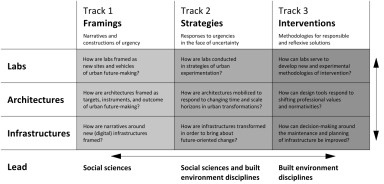Research Programme
Aims
The overall investigative objective of the research training group is to develop a comprehensive account of the strategies used by professionals involved in urban future-making. Even though their role is of strategic significance for the futures of cities amid multiple crises, little is known about these professionals’ core values and motivations, about the ways they (can) act, fail to act, or legitimize their agency, or about ways to engage their experience in a more fruitful way.
Our starting point is to recognize the fundamental temporal and scalar tensions which shape discourses and action around the built environment at present. These tensions stem from the clash between demands for transformative change and the requirements for maintaining the existing urban fabric, as well as the need to consider a global context of multiple interdependencies while dealing with the local and place-bound nature of the urban built environment. The pressing need to act, combined with rapid digitalization‐induced technological change and radically shifting constellations of actors, is fundamentally challenging established professional routines and knowledges.
Thematic focus
Empirically, three forms of phenomena – labs, architectures, and infrastructures – are studied. These are currently mobilized and addressed in urban future-making as key sites, objects, and vehicles of transformative change, each marked by distinct spatio-temporal modes of action. The thematic focus is on mobility systems, energy provision, and material use as interdependent fields of action. Currently, claims for transformative changes are most articulated and experimentation is most pronounced in these fields. This focus promises an in‐depth understanding of how experimental – and essentially short-term and small‐scale – approaches interact with or add up to longer‐term and more broadly adopted transformations. The research programme aims to foster investigations in various geographical contexts, with a strong international profile. It includes European and non-European case studies.
Organization
The research training group is organized into 3 tracks. Track 1, ‘framings’, focuses on the perspectives of the social sciences and asks which narratives serve to legitimate urgency and how problems are framed. Track 2, ‘strategies’, builds on interdisciplinary approaches and investigates how professionals act in the face of heightened uncertainty in order to engender transformative change. Track 3, ‘interventions’, focuses on the perspective of built environment disciplines. It examines the methodologies which allow professionals to take decisions and navigate evident urgencies in reflexive and responsible ways.
